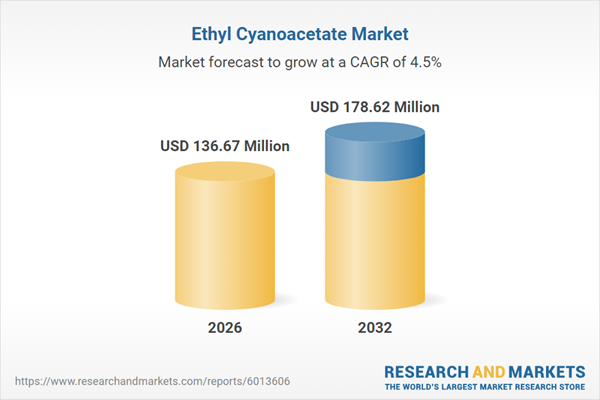Speak directly to the analyst to clarify any post sales queries you may have.
Ethyl cyanoacetate is an essential chemical intermediate, increasingly recognized for its versatile functionality in specialty chemistry and the broader industrial landscape. Its adaptive chemical profile ensures critical roles across procurement, manufacturing, and R&D, making it a core focus for organizations navigating evolving supply chain and regulatory complexities.
Market Snapshot: Ethyl Cyanoacetate Market Outlook
The Ethyl Cyanoacetate Market grew from USD 131.24 million in 2025 to USD 136.67 million in 2026. It is expected to continue growing at a CAGR of 4.50%, reaching USD 178.62 million by 2032. This trajectory reflects resilient demand, underpinned by expansion in agrochemical, pharmaceutical, and fine chemical applications, and a steady shift toward higher-grade specifications.
Scope & Segmentation: Comprehensive Market Coverage
- Purity Grades: High, medium, and standard purity, each tailored for specific end-use and quality requirements.
- Production Processes: Alkylation and Knoevenagel condensation remain industry standards, offering differentiated scalability, efficiency, and impurity profiles.
- End-Use Industries: Agrochemical synthesis, pharmaceutical intermediates, dye and pigment manufacturing, flavor and fragrance production, and specialty research applications.
- Distribution Channels: Direct-to-customer partnerships, regional and global distributors, and emerging online supply platforms catering to varying order volumes and replenishment needs.
- Regional Markets: Americas, Europe, Middle East & Africa, and Asia-Pacific, each shaped by distinct regulatory, logistical, and demand-side drivers.
- Technology Adoption: Increasing integration of analytical quality controls, digital supply chain platforms, and sustainable process enhancements for safety and compliance.
Key Takeaways for Senior Decision-Makers
- Technical versatility positions ethyl cyanoacetate as a foundational input for advanced chemical synthesis and specialty downstream products across regulated industries.
- Sustainability priorities are influencing manufacturers to optimize synthesis routes, reduce waste, and pursue cleaner production, meeting stricter environmental and buyer requirements.
- Supply chain agility—enabled by regional production hubs, digital visibility tools, and multi-sourcing—has become a central procurement and operational strategy.
- Markets are shifting toward partnership-driven models, emphasizing co-development, quality support, and application-specific technical services over traditional transactional relationships.
- Regulatory divergence across geographies requires tailored approaches to compliance, documentation, and capacity investment for global players.
- Competitive advantage increasingly depends on transparent quality management, sustainability credentials, and supply reliability in addition to price and capacity.
Tariff Impact: Navigating US Trade Policy Shifts
Recent tariff and trade policy changes in the United States have reshaped sourcing and investment strategies for ethyl cyanoacetate. Procurement teams are recalibrating supplier networks, opting for nearshoring or in-region manufacturing to control landed costs and ensure uninterrupted supply. Downstream, manufacturers and distributors have responded with process optimization, expanded domestic capacity, and logistics realignment, particularly for applications with strict regulatory or purity needs. High-purity buyers maintain demand resilience despite increased duties, while cost-sensitive applications adapt through reformulation or alternative chemistries.
Methodology & Data Sources
This analysis synthesizes insights from structured interviews with procurement, R&D, and operations leaders, as well as technical specialists at production sites. Secondary data were validated through peer-reviewed literature, regulatory resources, and detailed supply chain mapping to ensure robust scenario analysis and actionable insights.
Why This Report Matters
- Enables procurement, manufacturing, and commercial teams to anticipate regulatory, supply, and demand shifts in the evolving ethyl cyanoacetate landscape.
- Supports informed decision-making by illuminating the interplay between chemical properties, process technologies, supply chain risks, and global trade disruptions.
- Provides a foundation for investment prioritization, supplier engagement, and technical innovation tailored to market demands and compliance expectations.
Conclusion: Strategic Imperatives for Industry Stakeholders
Ethyl cyanoacetate’s evolving role in specialty and regulated markets underscores the need for agile supply strategies, rigorous quality controls, and proactive investment in process and partnership innovation. Aligning technical capabilities with market expectations will support enduring competitive position in this dynamic segment.
Additional Product Information:
- Purchase of this report includes 1 year online access with quarterly updates.
- This report can be updated on request. Please contact our Customer Experience team using the Ask a Question widget on our website.
Table of Contents
7. Cumulative Impact of Artificial Intelligence 2025
16. China Ethyl Cyanoacetate Market
Companies Mentioned
The key companies profiled in this Ethyl Cyanoacetate market report include:- BASF SE
- CABB Group
- Central Drug House (P) Ltd.
- DuPont de Nemours, Inc.
- Eastman Chemical Company
- EMCO Dyestuff Pvt. Ltd.
- Loba Chemie Pvt. Ltd.
- Merck KGaA
- Otto Chemie Pvt. Ltd.
- PRAVIN DYECHEM Pvt. Ltd.
- SimSon Pharma Pvt. Ltd.
- Sisco Research Laboratories Pvt. Ltd.
- Solvay Group
- TATEYAMA KASEI Co., Ltd.
- Thermo Fisher Scientific Inc.
- Tiande Chemical Holdings Limited
- Tokyo Chemical Industry Co., Ltd.
- Triveni Chemicals
Table Information
| Report Attribute | Details |
|---|---|
| No. of Pages | 180 |
| Published | January 2026 |
| Forecast Period | 2026 - 2032 |
| Estimated Market Value ( USD | $ 136.67 Million |
| Forecasted Market Value ( USD | $ 178.62 Million |
| Compound Annual Growth Rate | 4.5% |
| Regions Covered | Global |
| No. of Companies Mentioned | 19 |









